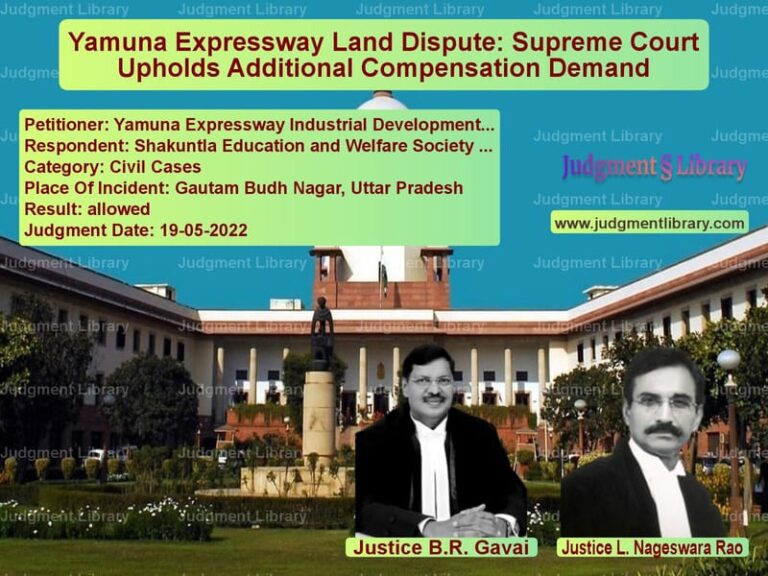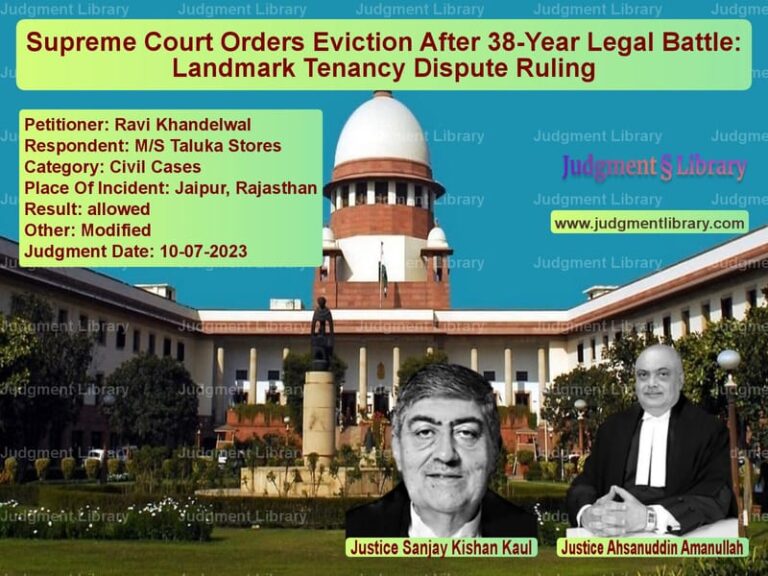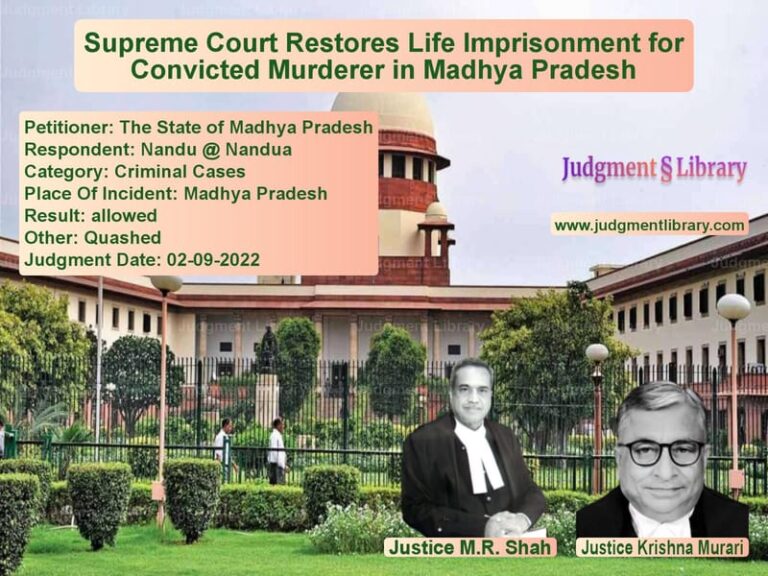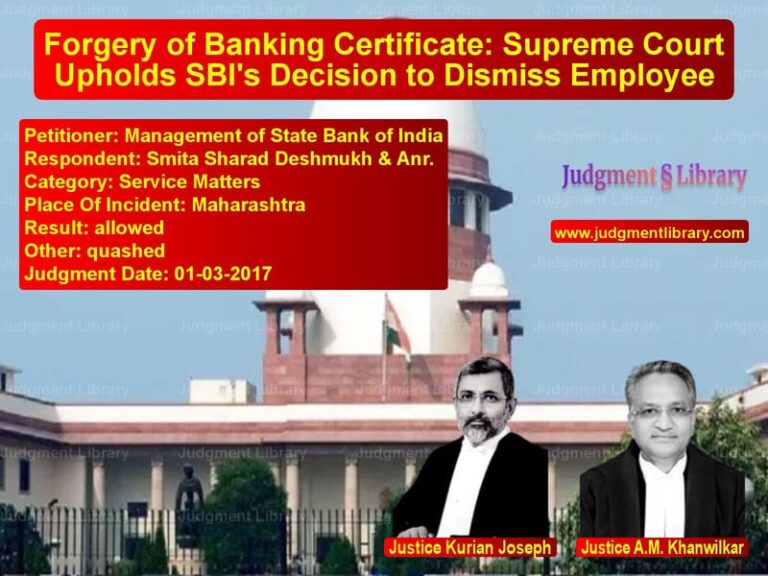IBC Limitation Period: Supreme Court Clarifies Application of Limitation Act to Insolvency Cases
The Supreme Court of India, in the case of Sagar Sharma & Anr. vs. Phoenix ARC Pvt. Ltd. & Anr., clarified the applicability of the Limitation Act to insolvency proceedings under the Insolvency and Bankruptcy Code (IBC), 2016. The judgment reaffirmed that applications under Section 7 of the IBC are governed by Article 137 of the Limitation Act, 1963, and not by the date of enforcement of the IBC.
Background of the Case
The case arose from a dispute concerning the applicability of limitation laws to proceedings under the IBC. The respondent, Phoenix ARC Pvt. Ltd., filed an application under Section 7 of the IBC against the appellants, claiming that the limitation period for filing such an application should begin from the date the IBC came into effect (December 1, 2016). The National Company Law Tribunal (NCLT) had admitted the insolvency petition, and the National Company Law Appellate Tribunal (NCLAT) upheld this decision.
However, the appellants, Sagar Sharma & Anr., challenged the ruling, arguing that the limitation period should be counted as per Article 137 of the Limitation Act, which provides a three-year limit from the date of default.
Key Legal Issues Considered
- Whether the limitation period for filing insolvency applications under the IBC starts from the date of default or from the date the IBC came into force (December 1, 2016).
- Whether Article 137 of the Limitation Act applies to applications filed under Section 7 of the IBC.
- Whether the presence of a mortgage deed impacts the limitation period for an insolvency proceeding.
Arguments by the Petitioner (Sagar Sharma & Anr.)
The appellants contended:
- The limitation period for an insolvency petition should be governed by Article 137 of the Limitation Act, which prescribes a three-year limitation period from the date of default.
- The NCLAT had erroneously held that the limitation period started from December 1, 2016, when the IBC came into effect.
- The NCLAT incorrectly relied on Article 62 of the Limitation Act, which applies to suits for mortgage enforcement, instead of Article 137.
Arguments by the Respondent (Phoenix ARC Pvt. Ltd.)
The respondents countered:
- The IBC is a special law and its implementation on December 1, 2016, should be considered a “trigger point” for the limitation period.
- The existence of a mortgage deed extends the limitation period beyond three years.
- The IBC was designed to ensure recovery of debts, and a strict limitation approach should not defeat its objectives.
Supreme Court’s Observations
The Supreme Court examined its earlier decision in B.K. Educational Services Private Limited vs. Parag Gupta & Associates, where it had already ruled that the IBC’s enforcement date is irrelevant for determining limitation.
The Court made the following key observations:
- The limitation period for filing insolvency applications under the IBC is governed by Article 137 of the Limitation Act, which prescribes a three-year limit from the date of default.
- The IBC does not create a fresh cause of action for old debts merely because it came into force in 2016.
- The presence of a mortgage deed is irrelevant in insolvency proceedings, as the IBC application is not for mortgage enforcement but for recognition of a financial default.
- The NCLAT erred in holding that the limitation period starts from the enforcement date of the IBC.
Final Judgment
The Supreme Court set aside the NCLAT’s ruling and directed that the matter be reconsidered, stating:
“The date of coming into force of the IBC does not and cannot form a trigger point of limitation for applications filed under the Code. Since ‘applications’ are petitions filed under the Code, it is Article 137 of the Limitation Act which will apply.”
The Court further held that:
“An application under Section 7 of the Code does not purport to be an application to enforce any mortgage liability. It is an application made by a financial creditor stating that a default, as defined under the Code, has been made.”
Implications of the Judgment
- For Financial Creditors: The ruling confirms that the limitation period for filing insolvency petitions under the IBC is three years from the date of default.
- For Borrowers: The decision provides relief to borrowers by preventing financial creditors from reviving old, time-barred debts through insolvency proceedings.
- For NCLT and NCLAT: The judgment reinforces that courts and tribunals must apply the correct limitation principles while adjudicating insolvency matters.
- For Future IBC Cases: The ruling settles confusion regarding limitation laws under the IBC and ensures consistency in adjudication.
Conclusion
The Supreme Court’s ruling in this case reaffirms the principles of limitation under the IBC and prevents misuse of the insolvency process to recover time-barred debts. The judgment ensures that insolvency proceedings remain within the statutory framework of the Limitation Act and that financial creditors act within the prescribed legal timeline.
Petitioner Name: Sagar Sharma & Anr..Respondent Name: Phoenix ARC Pvt. Ltd. & Anr..Judgment By: Justice Rohinton Fali Nariman, Justice V. Ramasubramanian.Place Of Incident: India.Judgment Date: 30-09-2019.
Don’t miss out on the full details! Download the complete judgment in PDF format below and gain valuable insights instantly!
Download Judgment: Sagar Sharma & Anr. vs Phoenix ARC Pvt. Ltd Supreme Court of India Judgment Dated 30-09-2019.pdf
Direct Downlaod Judgment: Direct downlaod this Judgment
See all petitions in Arbitration Act
See all petitions in Dispute Resolution Mechanisms
See all petitions in Bankruptcy and Insolvency
See all petitions in Judgment by Rohinton Fali Nariman
See all petitions in Judgment by V. Ramasubramanian
See all petitions in allowed
See all petitions in Remanded
See all petitions in supreme court of India judgments September 2019
See all petitions in 2019 judgments
See all posts in Arbitration and Alternate Dispute Resolution Category
See all allowed petitions in Arbitration and Alternate Dispute Resolution Category
See all Dismissed petitions in Arbitration and Alternate Dispute Resolution Category
See all partially allowed petitions in Arbitration and Alternate Dispute Resolution Category







